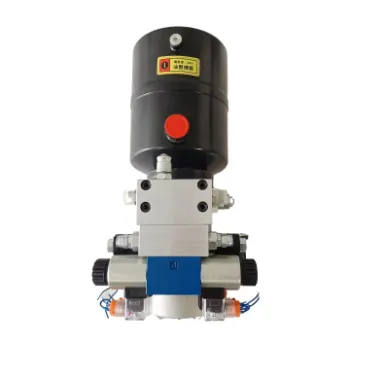फरवरी . 11, 2025 11:30 सूची पर वापस जाएं
The Importance of Hydraulic Cylinder Single Acting in the Industrial Sector
In the modern industrial field, hydraulic cylinders play an indispensable role as important power transmission devices. Among them, single acting hydraulic cylinders have received widespread attention due to their unique design and application characteristics. This article will explore the importance and application of hydraulic cylinder single acting in the industrial field.

The working principle of hydraulic cylinder single acting is relatively simple, mainly composed of a cylinder, piston, spring, and sealing device
When hydraulic oil enters one side of the cylinder, the pressure generated pushes the piston to complete the required linear motion, and the falling process relies on the reaction force of the spring. Compared with double acting hydraulic cylinders, hydraulic single acting cylinders have a simpler structure, lower production costs, and easier maintenance.
In industrial applications, hydraulic cylinder single acting is widely used in various fields such as push-pull devices, casting machinery, handling equipment, and tool machines
Especially in scenarios that require high-speed and intermittent movements, single action hydraulic cylinders can achieve operations in an effective and reliable manner, improving production efficiency. For example, in the packaging industry, single acting cylinders can quickly open and close packaging boxes, greatly accelerating the operation of production lines. In addition, in the fields of construction and mining, single acting cylinders are used as a power source for lifting and transporting heavy objects, enabling efficient operation in limited spaces.
In today's increasingly concerned energy consumption, hydraulic cylinder single action has also demonstrated its environmental characteristics
Due to its simple structural design, single hose hydraulic cylinders typically require less hydraulic oil, thereby reducing environmental pollution. In addition, the energy consumption of single acting hydraulic cylinders is generally low, which can reduce energy costs and promote sustainable development of enterprises while maintaining production efficiency.
In summary, the importance of single hydraulic cylinders in the industrial field is not only reflected in their wide application and efficient operation, but also in the economic benefits and environmental sustainability they bring. With the continuous advancement of technology, single acting hydraulic cylinders are expected to play a more significant role in future industrial development. At the same time, enterprises should pay attention to the research and application of hydraulic technology to improve overall production efficiency and enhance market competitiveness.
-
Unleash Power and Precision with a Double Acting Power Unit
समाचारJun.06,2025
-
Understanding Single Acting Hydraulic Cylinders: A Comprehensive Overview
समाचारJun.06,2025
-
The Power of Single Acting Hydraulic Cylinders: Solutions for Your Heavy Lifting Needs
समाचारJun.06,2025
-
Double-Acting Hydraulic Cylinders: The Key to Efficiency and Reliability in Industrial Machinery
समाचारJun.06,2025
-
Single Acting Power Units for Your Hydraulic Needs
समाचारJun.06,2025
-
Discover the Superior Performance of Single Rod Hydraulic Cylinders
समाचारJun.06,2025
